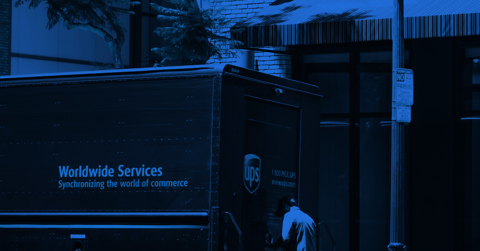How Last Mile Delivery Impacts Your Shipping Cost

When studying ecommerce leaders like Amazon, it becomes clear that focusing on the customer journey is the path to scaling growth. Last mile delivery is the stage of your supply chain that puts your product directly into the hands of your customers. Getting it right can significantly impact customer experience, driving increased sales.
How can optimizing your final mile logistics elevate the overall customer experience, and how does that impact your bottom line? Let’s explore its importance and the cost-saving benefits a well-optimized process can offer to your business and customers.
How last mile logistics works and why it is important
Last mile logistics is the process of taking your products from a distribution hub to the end customer. This step of your shipping operations directly impacts customer experience and represents a significant portion of shipping costs. In fact, it accounts for roughly 41% of overall supply chain costs, according to a report by Capgemini Research Institute.
For enterprise ecommerce, well-refined management of the last mile shipping stage can help separate you from your competitors, leading to:
- Increased customer loyalty
- Reduced operational costs
- Improved overall business performance
Top 5 benefits of optimized last mile fulfillment
Continuously improving how the final mile of your product’s movement through the ecommerce supply chain can make or break relationships with your customers and, if not appropriately handled, cost your business more than you initially forecasted.
A streamlined process offers these five benefits:
1. Reduced parcel spend
The final leg of the shipment process — factoring labor, fuel, vehicle maintenance, routing, and the potential for failed delivery attempts — accounts for a considerable portion of your annual shipping spend. You can reduce these expenses by diversifying your mix of regional last mile service providers near your fulfillment centers (FC) and enhancing your carrier selection process.
By better managing your last mile delivery logistics, you:
- Lower shipping costs: Efficient route optimization and shipment consolidation minimize fuel usage and cost per delivery.
- Optimize route planning: Advanced algorithms create efficient delivery routes that consider traffic, time windows, and vehicle capacity, increasing deliveries per trip.
- Bulk shipping discounts: Higher volumes and strategic negotiations with carriers can lead to better rates for consolidated shipments. Consider long-term contracts, volume commitments, or multi-carrier strategies to leverage your shipping volume for discounts.
Use shipping technology with real-time transit data to make smarter decisions and cut costs. Integrating software solutions with your existing systems allows you to optimize choices like selecting the best last-mile delivery service and uncover cost-saving opportunities throughout your fulfillment process. For example, using the Shipium platform to power data-driven decision-making, customers see a parcel spend reduction of roughly 10%.
2. Improved delivery efficiency
With consumers demanding quicker shipping than ever, maximizing the efficiency of your end-to-end product delivery has never been more important. According to CB Insights, 68% of consumers say shorter estimated delivery dates (EDD) influence online purchase decisions.
By streamlining and automating your delivery operations to select the best final mile carrier for every single order, you ensure:
- Dynamic dispatching: Real-time tracking allows quick responses to macro-environmental changes like service shutdowns, cutting overall time-in-transit and associated costs.
- Streamlined logistics: Improved coordination between distribution centers, delivery vehicles, and drivers creates a more fluid and efficient process, reducing potential time and resource-wasting bottlenecks.
- Proactive disruption management: Predictive analytics help anticipate and mitigate potential delays, ensuring more consistent and reliable delivery performance without the added cost of trying to meet your EDDs with premium services.
A great way to ensure your supply chain never becomes complacent is to analyze its performance continually. Advanced tools like Shipium Simulation allow you to test your fulfillment strategies against various scenarios, like implementing new or alternate last-mile service providers, to uncover opportunities to increase delivery efficiency and reduce your annual expenses.
3. Enhanced resource allocation
A significant factor in optimizing your final mile carrier management is analyzing your supply chain data to understand where your customers are, ensuring your products are as close as possible. You can be more proactive in planning and executing your fulfillment by properly integrating your systems and centralizing your data into one go-to source of truth.
With a final mile strategy driven by insights, you gain:
- Better delivery vehicle utilization: Dynamic routing and load optimization ensure each vehicle operates at maximum capacity, minimizing the required trips.
- Optimized workforce scheduling: AI-driven forecasting helps match FC staffing levels to delivery demand, improving team member productivity and lowering overtime costs.
- Improved stock management: Real-time tracking and predictive analytics enable more accurate inventory placement, reducing stockouts and overstock situations.
4. Minimized broken delivery promises
Providing your customers with transparent delivery estimates before they click the buy now button can boost conversions while failing to meet those estimates can negatively affect your bottom line. According to Descartes’ Consumer Sentiment Report, 44% of respondents lost trust in a brand or never ordered again because of poor delivery.
Optimizing your last mile delivery workflow helps keep your promises, offering:
- Increased on-time delivery: Enhanced carrier management and performance monitoring boost consistency when hitting your promised delivery windows.
- Accurate delivery dates: Advanced machine learning algorithms analyze historical data and current factors to provide more accurate EDDs at checkout.
- Reduced customer disappointment: Refined monitoring helps empower proactive communication with your customers about potential delays. This feedback loop lets you provide options for alternate delivery methods to help manage customer expectations effectively.
- Improved sales: Accurate delivery promises have been shown to boost conversion rates by up to 6% on average
5. Increased consumer satisfaction
Even though last-mile delivery is the final step in your supply chain, it is the first point of contact between your customer and your product, making it integral in ensuring your customers are satisfied with their purchase. As a Merkle report revealed, 75% of consumers are more loyal to brands that offer a great experience.
A well-refined final mile logistics process provides:
- Improved customer experience: Delivering packages with a seamless process that requires minimal effort on the part of the customer improves your brand’s overall ratings, boosting the confidence of future buyers.
- Real-time tracking: Giving up-to-the-minute visibility of a package's journey and precise ETA updates provides customers with the peace of mind they appreciate.
- Flexible delivery options: Offering choices like alternative drop-off locations or adjustable delivery windows empowers customers to tailor the delivery to their schedule.
- Long-term cost benefits: Happy customers will likely become repeat buyers and recommend your brand, increasing lifetime customer value.
How to select last mile delivery companies
There are many options for last mile delivery companies, depending on the regions where your customers reside.
When selecting carriers to add to your mix, consider:
| Considerations for last mile carrier selection | Benefits to your business |
| Cost and pricing structure | Clearer profit margins and the ability to offer competitive shipping rates to customers |
| Delivery speed and reliability | Improved customer satisfaction and competitive advantage |
| Technology and tracking features | Operational efficiency and customer visibility into their order status |
| Geographic coverage and flexibility | Ability to serve diverse customer bases and expand into new markets as needed |
| Customer service and support | Effective issue resolution and improved brand's reputation beyond the delivery itself |
Using a multi-carrier platform like Shipium, you simplify selection by leveraging a built-in network of reliable final-mile delivery service providers, such as AxleHire, CDL, TForce Logistics, Better Trucks, and OnTrac.
Optimize your final mile logistics with Shipium
With the Shipium platform, you can seamlessly integrate your existing systems to ensure every order is shipped at the right time from the right locations in your network, reducing your shipping expenses and boosting your customers' experience. Our Fulfillment Engine powers real-time decision-making, helping uncover cost-saving opportunities and saving our customers up to 12% on average.
Book a demo today and discover how Shipium refines your last mile delivery.
Frequently asked questions
What is final mile delivery?
Final mile delivery is the last stage of the shipping process. It’s when packages from a distribution center or local hub get delivered to their final destination, typically the customer's home or business.
What challenges does last mile delivery service pose for ecommerce shippers?
Ecommerce shippers face several challenges with last mile delivery operations, including:
- High shipping costs due to individual deliveries to diverse locations
- Meeting customer expectations for flexible delivery options
- Navigating urban areas and rural distances
- Managing failed delivery attempts and returns
- Providing real-time tracking and proof of delivery to customers
Why does final mile fulfillment have such a significant impact on parcel shipping costs?
Final mile fulfillment significantly impacts parcel shipping costs as it:
- Represents the most labor-intensive and time-consuming part of the shipping process
- Often involves multiple stops and low drop sizes, reducing efficiency
- Requires specialized infrastructure for city and remote deliveries
- Presents additional costs for failed deliveries and returns handling
- Sometimes requires premium services to meet customer demands for speed and flexibility

Jason is co-founder and CEO of Shipium where he guides the company's vision towards becoming the world’s best supply chain technology platform for ecommerce and retail. Prior to founding Shipium, he spent 19 years at Amazon as VP of Retail Systems and VP of Forecasting & Supply Chain. While there he owned the global software and operations group that powered Prime, Subscribe & Save and Pricing. He is a University of Washington grad and an engineer at heart who loves solving complex scaling problems.


